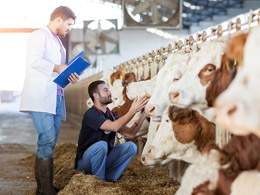
Let’s face it. Insurance isn’t always top of your list when it comes to juggling competing priorities of your farm business. The temptation to simply renew your premium when it comes through in a bid to get one more thing ticked off the list is all too easy.
However, if you’re not regularly reviewing the cover you need to keep your farm running should the worst happen, you may be leaving yourself open to unnecessary risk.
The start of a new year is a good time to ask yourself these ten questions to see if your insurance might benefit from a health check.
1. Are you adequately covered in the event of business interruption?
If you have selected this option in your cover then you are on the right tracks already… but have you fully assessed the costs involved in getting your business back up and running in the event of an incident? For example, if a building burns down, have you given a long enough timeframe for demolition, planning and rebuild? Or is your income from renewables factored into this cover? Things invariably take longer than anticipated and looking at a 12-month rather than a 6-month horizon may cost more in premium but is likely to see you covered throughout any major incident.
2. Do you have cover for environmental damage?
With new legislation in consultation that could see even more onus pushed onto the farmer in the case of an environmental incident and fines of up to £73,000* in recent years, insurance is a way of minimising the impact of such a major issue.
3. Has the nature of any of your business changed?
For example, if you have started storing some of the caravans that stay at your campsite, you may need a different type of cover.
4. Have you purchased any livestock in the last year that need covering?
This could be a single pedigree animal to a gradual increase in your flocks or herds.
5. Has your workforce changed in the last year?
Have you started to hire more contractors or have you changed any of your systems of work? If you already employ people it is likely you have employer’s liability cover but with any changes to systems of work you may want to carry out new risk assessments and ensure your levels of cover are adequate should the worst happen. You will also need to ensure that the wage bill you declare on your insurance is accurate in this respect.
6. Have you bought a new vehicle in the last 12 months?
It may sound obvious, but we have experienced claims where clients have forgotten to add vehicles onto their cover at point of purchase.
7. Have any of your vehicles changed in value recently?
This may be a vintage tractor or old land rover that has gone up in value or a vehicle that has depreciated or been involved in an accident and so lost some value.
8. Have you converted any of your buildings recently?
This may have an impact not just on the value of the building but you may also need to consider additional types of cover. For example, do you have enough public liability cover as a result of converting an old barn into a wedding venue?
9. Have you started up any new initiatives in the last year?
Many farmers are looking to diversify in order to bring in an additional source of income. While you’d automatically think of covering big ticket items such as wind turbines or B&B buildings, something as small as selling a few eggs from an honesty box at the bottom of your farm could have an implication for your cover. Usually this will relate to the amount of public liability cover you will require.
10. When was the last time you checked whether your premium was competitive?
While you may not want to go through this process every year, getting a quote from more than one provider will ensure you are getting the right cover at the right price.
By asking just a few questions you can make sure your insurance is adequate and you can continue to run your business, safe in the knowledge that should the worst happen, you are covered.
* Source: http://www.waterbriefing.org/home/regulation-and-legislation/item/8436-farm-must-pay-£73k-in-fines-and-costs-for-river-pollution
